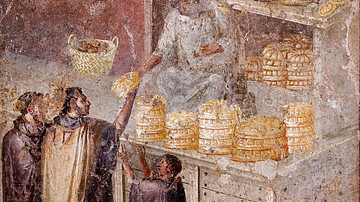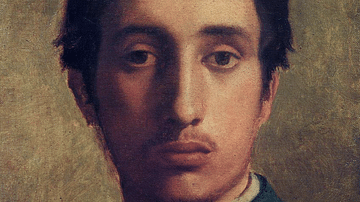Search
Did you mean: Circe?
Search Results

Quiz
Daily Life in Ancient Rome
Daily life ancient Rome villa insula domus atrium compluvium cubiculum culina impluvium lararium peristylium posticum tablinum taberna triclinium vestibulum paterfamilias materfamilias Circus Maximus factions amphitheater Colosseum baths...

Collection
The Architecture of Ancient Rome
Roman architecture was nothing if not eclectic. From ingenious underfloor heating to gravity-defying arches, the Romans added to the Classical repertoire such grandiose structures as the triumphal arch, basilica, amphitheatre, and city tower...

Definition
Romulus and Remus
In Roman mythology, Romulus and his twin brother Remus were the founders of the city of Rome. They were the children of Rhea Silvia and Mars (or in some variations the demi-god hero Hercules) and their story is recorded by many authors including...

Definition
Edgar Degas
Edgar Degas (1834-1917) was a French impressionist painter who used many different media to capture dancers, bathers, horse races, and scenes from Parisian café society. A keen photographer, Degas' paintings frequently show real-life captured...

Definition
Commodus
Commodus was Roman emperor from 180 to 192 CE. With the death of Roman Emperor Marcus Aurelius in March of 180 CE, the long reign of the five good emperors came to an end and with it so did the Pax Romana (the Roman Peace). Those emperors...

Definition
Chariot
The chariot was a light vehicle, usually on two wheels, drawn by one or more horses, often carrying two standing persons, a driver and a fighter using bow-and-arrow or javelins. The chariot was the supreme military weapon in Eurasia roughly...

Definition
D-Day
D-Day was the first day of Operation Overlord, the Allied attack on German-occupied Western Europe, which began on the beaches of Normandy, France, on 6 June 1944. Primarily US, British, and Canadian troops, with naval and air support, attacked...

Definition
Helios
Helios (also Helius) was the god of the Sun in Greek mythology. Helios rode a golden chariot which brought the Sun across the skies each day from the east (Ethiopia) to the west (Hesperides). Helios was famously the subject of the Colossus...

Definition
Mercury (Deity)
Mercury (Mercurius) was the Roman god of commerce, often serving as a mediator between the gods and mortals, his winged feet giving him the advantage of speed, and so was the patron of circulation in general - of people, goods and messages...

Definition
Lucius Tarquinius Superbus
Lucius Tarquinius Superbus ('Tarquin the Proud') was traditionally the seventh and last king of ancient Rome before it became a republic. He belonged to the Etruscan Tarquinii clan, reigned from 534 to 510 BCE, and was infamous for his tyrannical...